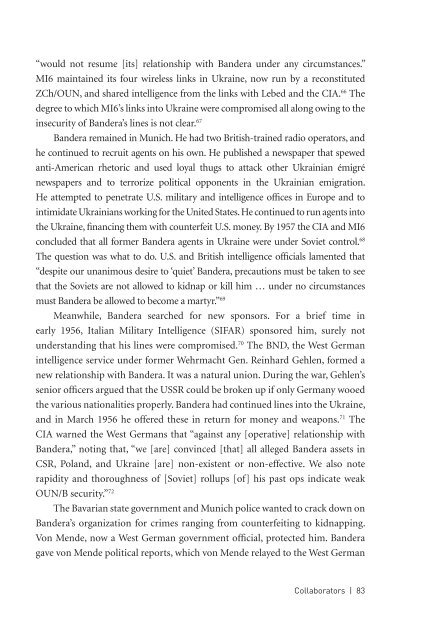hitlers-shadow
hitlers-shadow
hitlers-shadow
You also want an ePaper? Increase the reach of your titles
YUMPU automatically turns print PDFs into web optimized ePapers that Google loves.
“would not resume [its] relationship with Bandera under any circumstances.”<br />
MI6 maintained its four wireless links in Ukraine, now run by a reconstituted<br />
ZCh/OUN, and shared intelligence from the links with Lebed and the CIA. 66 The<br />
degree to which MI6’s links into Ukraine were compromised all along owing to the<br />
insecurity of Bandera’s lines is not clear. 67<br />
Bandera remained in Munich. He had two British-trained radio operators, and<br />
he continued to recruit agents on his own. He published a newspaper that spewed<br />
anti-American rhetoric and used loyal thugs to attack other Ukrainian émigré<br />
newspapers and to terrorize political opponents in the Ukrainian emigration.<br />
He attempted to penetrate U.S. military and intelligence offices in Europe and to<br />
intimidate Ukrainians working for the United States. He continued to run agents into<br />
the Ukraine, financing them with counterfeit U.S. money. By 1957 the CIA and MI6<br />
concluded that all former Bandera agents in Ukraine were under Soviet control. 68<br />
The question was what to do. U.S. and British intelligence officials lamented that<br />
“despite our unanimous desire to ‘quiet’ Bandera, precautions must be taken to see<br />
that the Soviets are not allowed to kidnap or kill him … under no circumstances<br />
must Bandera be allowed to become a martyr.” 69<br />
Meanwhile, Bandera searched for new sponsors. For a brief time in<br />
early 1956, Italian Military Intelligence (SIFAR) sponsored him, surely not<br />
understanding that his lines were compromised. 70 The BND, the West German<br />
intelligence service under former Wehrmacht Gen. Reinhard Gehlen, formed a<br />
new relationship with Bandera. It was a natural union. During the war, Gehlen’s<br />
senior officers argued that the USSR could be broken up if only Germany wooed<br />
the various nationalities properly. Bandera had continued lines into the Ukraine,<br />
and in March 1956 he offered these in return for money and weapons. 71 The<br />
CIA warned the West Germans that “against any [operative] relationship with<br />
Bandera,” noting that, “we [are] convinced [that] all alleged Bandera assets in<br />
CSR, Poland, and Ukraine [are] non-existent or non-effective. We also note<br />
rapidity and thoroughness of [Soviet] rollups [of] his past ops indicate weak<br />
OUN/B security.” 72<br />
The Bavarian state government and Munich police wanted to crack down on<br />
Bandera’s organization for crimes ranging from counterfeiting to kidnapping.<br />
Von Mende, now a West German government official, protected him. Bandera<br />
gave von Mende political reports, which von Mende relayed to the West German<br />
Collaborators | 83


